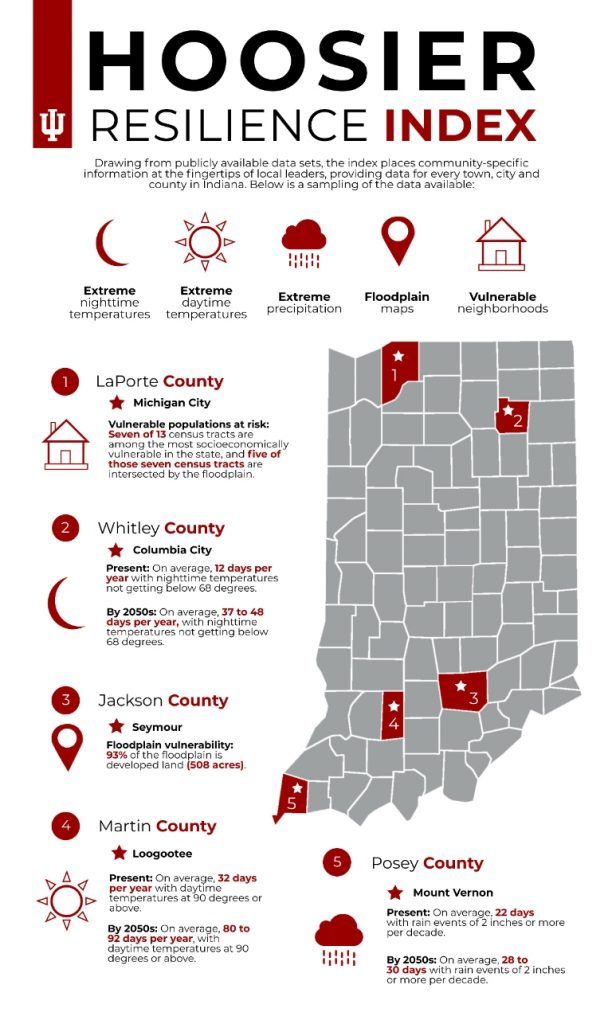Environmental Resilience Institute
BLOOMINGTON, Ind. — Indiana University’s Environmental Resilience Institute, part of the Prepared for Environmental Change Grand Challenge initiative, has launched the Hoosier Resilience Index, a first-of-its-kind online tool to help local governments and Indiana residents understand how their communities are vulnerable to climate change and what they can do to respond.
Drawing from publicly available datasets, the index places community-specific information at the fingertips of local leaders, providing data for every town, city and county in the state. The data include information about extreme heat and precipitation projections, flood plain and land use maps, and demographic information of vulnerable neighborhoods.
The index helps local governments assess their readiness for environmental change and track community progress. By filling out a questionnaire, communities can score themselves and identify areas where they can work toward greater resilience.
“Every Indiana community is facing challenges as a result of the environmental changes that are happening,” said Janet McCabe, director of the Environmental Resilience Institute. “Across the state, we will be seeing more days of extreme heat, heavy rain and flooding, but there is no one-size-fits-all approach to dealing with these impacts. The Hoosier Resilience Index puts local governments in control of their community’s future — not only showing every town, city and county the challenges they are likely to face in the years ahead, but also supplying a framework to help local officials assess community preparedness, prioritize the most important actions and make a plan.”
 Scientific evidence shows that the climate is changing in the Midwest, with average temperatures expected to increase by 6 to 10 degrees Fahrenheit by 2100 and precipitation becoming heavier and more damaging in the winter and spring (and less frequent in the summer and fall). Most rural towns and small- to mid-sized cities do not have access to experts who can help them understand the direct implications of these changes, such as impacts to the local economy, housing and public health.
Scientific evidence shows that the climate is changing in the Midwest, with average temperatures expected to increase by 6 to 10 degrees Fahrenheit by 2100 and precipitation becoming heavier and more damaging in the winter and spring (and less frequent in the summer and fall). Most rural towns and small- to mid-sized cities do not have access to experts who can help them understand the direct implications of these changes, such as impacts to the local economy, housing and public health.
The index draws from a wide range of federal and state datasets — including information supplied by the Indiana Climate Change Impacts Assessment, the U.S. Census Bureau and the Environmental Protection Agency — to help communities plan for these risks. It is the first state-specific tool to package climate change information for local governments in this way.
“One of the critical roles of municipal government is comprehensive and long-term planning,” said Matt Greller, CEO of Accelerate Indiana Municipalities. “I don’t think cities and towns in Indiana have ever had a tool like the Hoosier Resilience Index to look at environmental factors as an overlay into that planning process.”
To design the index, the Environmental Resilience Institute consulted local officials across the state and worked with four “beta testing” communities. Local officials from less populous towns and counties, who sometimes struggle to find data relevant to their communities, were especially receptive to the index.
“One of the strengths of the Hoosier Resilience Index is the fact that it is data based on my community,” said Denny Spinner, mayor of Huntingburg, a town of about 6,000 in southern Indiana. “There’s tremendous value in that, and I think that’s something that mayors across the state are really looking for.”
To learn more about the Hoosier Resilience Index, register to attend webinars on Dec. 2.
What they’re saying
“As our environment changes and our relationship to it evolves, we know that we have to be ready. By both learning about how the environment is changing and examining our plans for these drastic changes, Noble County is actively preparing for change. The index is going to help us examine our plans and determine next steps based on our risk. Local governments across the state have been working on strengthening infrastructure and building more resiliently, and this tool helps provide support for these efforts.” — Kenneth Hughes, plan director of Noble County, Indiana
“I think the tool will be a useful index for Hoosier communities and could be a model for other states to follow. The assessment questions forced us to look at the impacts so many of our local policies have on the environment around us, and the questions themselves helped us identify areas where we need to be better prepared for the impacts of climate change on our community.” — Jonathan Leist, town manager of Culver, Indiana
“The Hoosier Resilience Index makes public data easier for community leaders to assemble and examine and provides a remarkable suite of information that is relevant to all of a community’s planning needs for anticipated climate change impacts. It will be an obvious springboard for action.” — Michael Hamburger, professor of earth and atmospheric sciences, IU Bloomington
Click here for a video introducing the tool.
